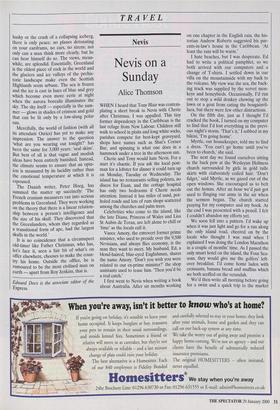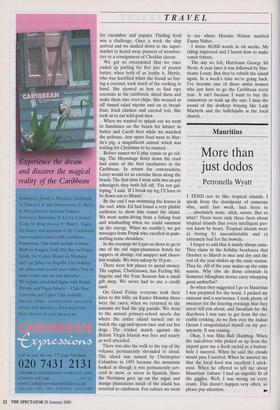Nevis
Nevis on a Sunday
Alice Thomson
WHEN I heard that Tony Blair was contem- plating a short break in Nevis with Cherie after Christmas, I was appalled. This tiny former dependency in the Caribbean is the last refuge from New Labour. Children still walk to school in plaits and long white socks, parishes compete for best-kept graveyard, shops have names such as Shat's Corner Bar, and spinning is what one does in a hammock under a tree in the afternoon sun.
Cherie and Tony would hate Nevis. For a start it's chaotic. If you ask the local post- man for a lobster for dinner it could turn up on Monday, Tuesday or Wednesday. The island has no restaurants selling polenta, no discos for Euan, and the cottage hospital has only two bedrooms if Cherie needs attention. Instead it has miles of sand, pot- holed roads and lots of rum shops scattered among the churches and palm trees. Celebrities who come to the island, like the late Diana, Princess of Wales and Lisa St Aubin de Teran, are left alone to chill or 'lime' as the locals call it.
Vance Amory, the extrovert former prime minister, who used to preside over the 9,500 Nevisians, and always flies economy, is the man they want to meet. My husband, Ed, a blond-haired, blue-eyed Englishman, shares the name Amory. 'Don't you wish you were related to our ex-prime minister?' the shop assistants used to tease him. 'Then you'd be a real catch.'
I first went to Nevis when writing a book about Australia. After six months working on one chapter in the English rain, the his- torian Andrew Roberts suggested his par- ents-in-law's house in the Caribbean. 'At least the rain will be warm.'
I hate beaches, but I was desperate. Ed had to write a political pamphlet, so we both arrived with our computers and a change of T-shirts. I settled down in our villa on the mountainside with my back to the volcano. My view was the sea, the back- ing track was supplied by the vervet mon- keys and honeybirds. Occasionally, I'd run out to stop a wild donkey chewing up the lawn or a goat from eating the bougainvil- laea, but there were few other distractions.
On the fifth day, just as I thought I'd cracked the book, I turned on my computer to find that I'd lost everything in the previ- ous night's storm. 'That's it,' I sobbed in my bikini, 'I'm going home'.
Myrtle, our housekeeper, told me to find a dress. 'You can't go home until you've been to church,' she said.
The next day we found ourselves sitting in the back pew at the Wesleyan Holiness church surrounded by girls in gold tulle skirts with elaborately coiled hair. 'Don't fidget,' said Myrtle, as we gazed out of the open windows. She encouraged us to belt out the hymns. After an hour we'd just got used to flinging our arms in the air when the sermon began. The church started praying for my computer and my book. At the end I was presented with a pencil. I felt I couldn't abandon my efforts yet.
We soon fell into a pattern. I'd wake up when it was just light and go for a run along the only island road, cheered on by the locals who thought I was mad when I explained I was doing the London Marathon in a couple of months' time. As I passed the only smart hotel on the island, the Four Sea- sons, they would give me the golfers' left- over breakfast. I'd come home laden with croissants, banana bread and muffins which we both scoffed on the verandah.
We'd then write all morning before going for a swim and a quick trip to the market for cucumber and papaya. Finding food was a challenge. Once a week the ship arrived and we dashed down to the super- market to hoard away punnets of strawber- ries or a consignment of Cheddar cheese.
We got so overexcited that we once ended up jostling for five jars of peanut butter, when both of us loathe it. Myrtle, who was horrified when she found us buy- ing a coconut, took much of the cooking in hand. She showed us how to find ripe coconuts in the rainforest, shred them and make them into oven chips. She weaned us off tinned salad nigoise and on to bread- fruit, fried chicken and curried roti. She took us to eat wild-goat stew.
When we wanted to splash out we went to Sunshines on the beach for lobster in butter and Carob beer while we watched the pelicans. Any spare food went to Myr- tle's pig, a magnificent animal which was waiting for Christmas to be roasted.
Before sunset we'd play tennis or go rid- ing. The Hermitage hotel down the road had some of the best racehorses in the Caribbean. In return for conversation, Leroy would let us exercise them along the beach. The first time I went with two ex-pat schoolgirls they both fell off. `I'm not gal- loping,' I said. 'If I break my leg I'll have to be flown out to Miami.'
By the end I was swimming the horses in the surf, while Ed had found a very pliable carthorse to show him round the island. We went scuba-diving from a fishing boat and windsurfing when we could summon up the energy. When we couldn't, we got massages from Frank who excelled in pum- melling tense shoulders.
In the evenings we'd put on shoes to go to one of the old sugar-plantation hotels for suppers of shrimp, red snapper and choco- late roulade. We were asleep by 10 p.m.
There were few places to spend money. The capital, Charlestown, has Feeling Me lingerie and the Four Seasons has a small gift shop. We never had to use a credit card.
On Good Friday everyone took their kites to the hills; on Easter Monday there were the races; when we returned in the autumn we had the pig parade. We went to the annual primary-school sports day where the entire island turned out to watch the egg-and-spoon race and eat hot dogs. The cricket match against the British Virgin Islands was free and nearly as well attended.
There was also the walk to the top of the volcano, permanently shrouded in cloud. The island was named by Christopher Columbus in 1493 because the mountain looked as though it was permanently cov- ered in snow, or nieves in Spanish. Since the Nevisians gave up on the sugar and mango plantations much of the island has reverted to rainforest. For culture we went to see where Horatio Nelson married Fanny Nisbet.
I wrote 80,000 words in six weeks. My riding improved and I learnt how to make conch fritters.
The day we left, Hurricane George hit Nevis. A year later it was followed by Hur- ricane Lenny. But they've rebuilt the island again. In a week's time we're going back. I've become one of those awful women who just have to go the Caribbean every year. It isn't because I want to buy the cruisewear or soak up the sun; I miss the sound of the donkeys braying like Lady Macbeth and the hallelujahs at the local church.



















































































 Previous page
Previous page